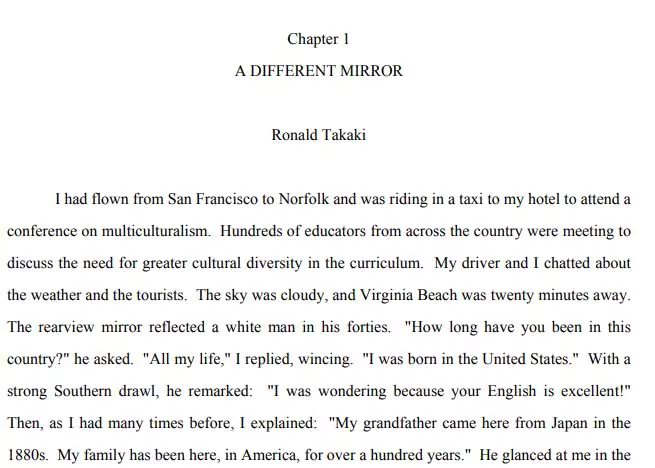‘A Different Mirror A History Of Multicultural America’ PDF Quick download link is given at the bottom of this article. You can see the PDF demo, size of the PDF, page numbers, and direct download Free PDF of ‘Books A Different Mirror’ using the download button.
A Different Mirror By Takaki Ronald Book PDF Free Download

A Different Mirror
Chapter 1
I had flown from San Francisco to Norfolk and was riding in a taxi to my hotel to attend a conference on multiculturalism.
Hundreds of educators from across the country were meeting to discuss the need for greater cultural diversity in the curriculum.
My driver and I chatted about the weather and the tourists. The sky was cloudy, and Virginia Beach was twenty minutes away.
The rearview mirror reflected a white man in his forties. “How long have you been in this country?” he asked. “All my life,” I replied, wincing.
“I was born in the United States.” With a strong Southern drawl, he remarked: “I was wondering because your English is excellent!” Then, as I had many times before, I explained: “My grandfather came here from Japan in the 1880s.
My family has been here, in America, for over a hundred years.
” He glanced at me in the mirror. Somehow I did not look “American” to him; my eyes and complexion looked foreign.
Suddenly, we both became uncomfortably conscious of a racial divide separating us.
An awkward silence turned my gaze from the mirror to the passing landscape, the shore where the English and the Powhatan Indians first encountered each other.
Our highway was on land that Sir Walter Raleigh had re-named “Virginia” in honor of Elizabeth I, the Virgin Queen.
In the English cultural appropriation of America, the indigeneous peoples themselves would become outsiders in their native land.
Here, at the eastern edge of the continent, I mused, was the site of the beginning of multicultural America.
Jamestown, the English settlement founded in 1607, was nearby: the first twenty Africans were brought here a year before the Pilgrims arrived at Plymouth Rock.
Several hundred miles off shore was Bermuda, the “Bermoothes” where William Shakespeare’s Prospero had landed and met the native Caliban in The Tempest.
Earlier, another voyager had made an Atlantic crossing and unexpectedly bumped into some islands to the south.
Thinking he had reached Asia, Christopher Columbus mistakenly identified one of the islands as “Cipango” (Japan).
In the wake of the Admiral, many peoples would come to America from different shores, not only from Europe but also Africa and Asia.
One of them would be my grandfather. My mental wandering across terrain and time ended abruptly as we arrived at my destination.
I said goodbye to my driver and went into the hotel, carrying a vivid reminder of why I was attending this conference.
Questions like the one my taxi driver asked me are always jarring, but I can understand why he could not see me as American.
He had a narrow but widely shared sense of the past — a history that has viewed American as European in ancestry.
“Race,” Toni Morrison explained, has functioned as a “metaphor” necessary to the “construction of Americanness”: in the creation of our national identity, “American” has been defined as “white.”1 But America has been racially diverse since our very beginning on the Virginia shore, and this reality is increasingly becoming visible and ubiquitous.
Currently, one third of the American people do not trace their origins to Europe; in California, minorities are fast becoming a majority.
They already predominate in major cities across the country — New York, Chicago,
Atlanta, Detroit, Philadelphia, San Francisco, and Los Angeles.
This emerging demographic diversity has raised fundamental questions about America’s identity and culture.
In 1990, Time published a cover story on “America’s Changing Colors.”
“Someday soon,” the magazine announced, “white Americans will become a minority group.”
How soon? By 2056, most Americans will trace their descent to “Africa, Asia, the Hispanic world, the Pacific Islands, Arabia — almost anywhere but white Europe.”
This dramatic change in our nation’s ethnic composition is altering the way we think about ourselves.
| Author | Takaki Ronald |
| Language | English |
| No. of Pages | 22 |
| PDF Size | 7 MB |
| Category | Essay |
| Source/Credits | likeawhisper.files |
A Different Mirror By Takaki Ronald Book PDF Free Download
